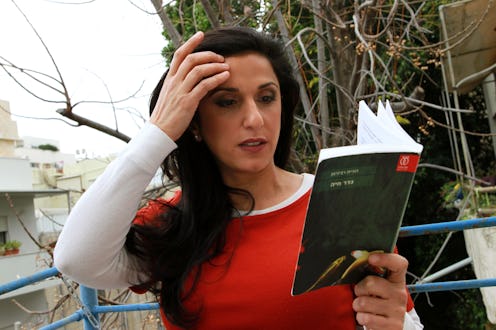Books
Israel Bans Inter-Faith Love Story From Schools
Though we hear a lot about books being banned or challenged in U.S. schools for political reasons, this isn't the only country where such things happen. For example, recently the Israeli Ministry of Education banned the novel Borderlife from Israeli schools. Although students can still access the book, it has been blocked from the national high school curricula and will no longer be taught in schools.
The novel Gader Haya by Dorit Rabinyan, which is rendered as "borderlife" in English, is a love story between a Palestinian man and an Israeli woman who meet in New York City. Published in 2014, it has won several awards, including Israel's prestigious Bernstein literary prize, and Israeli teachers requested that it be included in the recommended curriculum, but the Ministry of Education ultimately decided to exclude it, saying that they believe it could "do more harm than good."
“Marrying a non-Jew is not what the education system is educating about,” Dalia Fenig, a Ministry of Education official, told a leading Israeli news site on Thursday.
Understandably, many teachers and students were upset by the decision, and the ministry backed away slightly from their decision, announcing that teachers could teach the book in advanced literature courses. But the Minister of Education Naftali Bennett, who is a member of the right-win Jewish Home party told the press that although he was not involved in the initial decision, he supports restricting the book.
As is often the case with book bans, however, it has in some ways been counterproductive. Booksellers report that sales of the novel have skyrocketed since news of the ban first broke. Rabinyan's agent told the BBC that more than 5,000 copies have been sold in the country since the ban was announced, which is quite a lot for a country as small as Israel.
"I think this whole march to bookstores is a demonstration," Rabinyan told AFP in an interview. "It is not only my fans that buy Borderlife, it is the fans of Israeli democracy. By buying my novel they reconfirm their trust and belief in Israel's liberalism, in Israel's freedom of choice and speech."
And Time Out Tel Aviv has also created its own protest of the ban in the form of a video featuring interfaith couples kissing.
Fiction provides a unique way to explore complex topics and introduce nuanced perspective on issues, and as such reading fictional works that touch on complicated realities — such as, say, the various ethnic fault lines in Israeli society — can be an invaluable experience for young people. Banning books from schools, especially if the reason is politically motivated, is not only unjust for students, but also ultimately a poor idea for society.
Here in the U.S., we have our own issues with people trying to keep specific books out of the hands of children and young adults. And it seems we are far from the only country where you can find people with the impulse to block access to literature. Here's hoping that the ban only results in more students reading Borderlife, not fewer. Because banning books is never the way to go.
